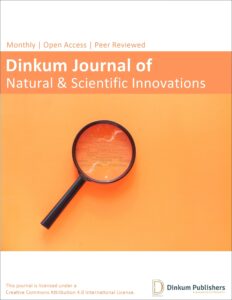Dinkum Journal of Natural & Scientific Innovations
is an open-access journal that publishes novel researches.
DJNSI publishes original research, narrow review article, systematic analysis, empirical, competitive analyses, observational articles, content analyses, bibliographic analyses, and critical analyses covering recent advancement in management and related disciplines.
About Journal
- Abbreviation: DJNSI
- Frequency: Monthly
-
Anatomization: Double-Blind Peer Review
- Language: English
- Access: Open Access
- Publishers: Dinkum Publishers
Journal Scope
- Math
- Botany
- Zoology
- Physics
- Chemistry
- Agriculture
- Geosciences
- Cyber Science
- Environmental
- Engineering Science
About the Journal
We request the authors to meet the essential criteria before submitting their manuscript so that it enables us to carry on the further process conveniently without delay. Authors are requested to make sure that their article adheres to the following guidelines. Before your submission, please confirm the checklist More…
There is no submission charges, DJNSI will require an article processing charge (APC) that will be billed to the correspondence author after acceptance of article. Apart from this article processing charge there are no other fees (for example submission charges, per page charges, or color charges).
The article processing charge (APC): $100
Chief Editor
- Dr. Gerard Bearer, Fritz Haber Institute, Berlin, Germany.
Senior Editor
- Dr. Vivian Meijer, The University of Hong Kong, Hong Kong.
Managing Editor
-
Dr. Sara Braiser, The University of Newcastle Callaghan, Australia.
Editors
- Dr. Anwar Shams, College of Science and Arts, University of Bisha.
- Zhenan Bao, Stanford University Stanford, California, USA.
- Guy Bao, University of California, San Diego La Jolla, California, USA.
- Margaret Bertrand, University of Auckland Auckland, New Zealand.
- Marianne Brimble, California Institute of Technology Pasadena, California USA.
- Mark Bronner, University of Oxford Oxford, UK.
- Long Brouard, California Institute of Technology Pasadena, California, USA.
- Mario R.Cai, University of Utah School of Medicine Salt Lake City, Utah, USA.
- Kathryn Capecchi, The University of Hong Kong Hong Kong, China.
- Tim Cheah ,University of Oxford Oxford, UK.
- Edward De Coulson ,University of California, Los Angeles Los Angeles, California, USA.
- Dr. Christina Anderson, Hitotsubashi, Japan
- Dr. Mia Justin, University of Singapore
- Dr. Linda Suddaby, University of Alberta
- Dr. Eleanor Lockett, Warwick School, UK
- Dr. Howard Ahmadjian, Uni of North Carolina
- Dr. Marc Amason, Georgia University, US
- Dr. Julia Bergh, State University,Iowa
- Dr. Christina Anderson, University of Liverpool
- Dr. Mc Anderson, University of St. Gallen
- Dr. Bill Roy, City University of London
- Dr. Emma Mudambi, Dublin City University
- Kuiling Fudan, Shanghai Institute of Organic Chemistry Shanghai, China.
- Heino DingRadboud, University Nijmegen, The Netherlands.
- Ben Radboud, University of Groningen Groningen, The Netherlands.
- Makoto Feringa, University of Tokyo Tokyo, Japan.
- Harry Fujita, California Institute of Technology Pasadena, California, USA.
- Eric J. Gray, Harvard University Cambridge, Massachusetts, USA.
- Dudley Heller, Harvard University Cambridge, Massachusetts, USA.
- Herschbach, Institute for Biomedical Innovation Los Angeles, California, USA.
- Kimoon Lee , POSTECH Pohang, South Korea.
- Susumu Kim, Kyoto University & iCeMS Kyoto, Japan.
- Eugenia Kitagawa, University of Toronto Toronto, Canada.
- Carole Kumacheva, Northwestern University Evanston, Illinois, USA.
- MyongsooLaBonne, University Shanghai, China.
Dinkum Journal of Natural & Scientific Innovations (DJNSI) does not collect information from non-registered users. The data collected from registered users of this journal falls within the scope of the standard functioning of peer-reviewed journals. It includes information that makes communication possible for the editorial process; it enables collecting aggregated data on submissions and publications and tracking geopolitical and social elements of scholarly communication.
Engagement
Acceptance Ratio
Our editorial process verify large knowledge gap and try to produce high level research work.




